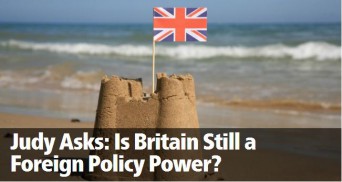È la domanda che Judy Dempsey rivolge a nove esperti: Fraser Cameron (Direttore di EU-Asia Centre), Malcolm Chalmers (Direttore di ricerca UK defense policy al Royal United Services Institute), Andrew Duff (ex-parlamentare europeo), Jonathan Eya (Direttore Studi Internationazionali presso Royal United Services Institute), James Rogers (redattore per European Geostrategy e docente in European security presso il Baltic Defence College), Gianni Riotta, Brendan Simms (Professore di Storia delle Relazioni Internazionali all' University of Cambridge), Stephen Szabo (Direttore di Transatlantic Academy), Xenia Wickett (Direttore United States presso Chatham House).
La risposta di Gianni Riotta:
The UK carries, and will continue to carry, a tremendous moral mantle fashioned in London during World War II. Officers who graduate from the Royal Military Academy at Sandhurst will still be admired, while the traditions so vividly narrated by the late historian John Keegan live on.
Yet Prime Minister David Cameron—or prime minister Ed Miliband should the opposition Labour Party win the May 2015 general election—has to cut a much better deal for Britain when navigating between Washington and Brussels. The special relationship that binds the United States and the UK should not be used to taunt the Europeans, and savvy London should be a transatlantic goodwill ambassador when it comes to defense.
As the Economist has noted, the UK has only three military personnel fighting the Islamic State in Iraq’s non-Kurdish areas, while Spain and Italy have deployed around 300 troops each. This cannot be. The new British Strategic Defense and Security Review due by the end of 2015 should make London the crucial center of NATO’s brand-new rapid reaction force, while coordination with Paris could avoid further military budget cuts.
Britain’s policymakers should reread the speech that former prime minister Winston Churchill made at the Council of Europe in August 1950 and subscribe to his wise proposal: “The Assembly, in order to express its devotion to the maintenance of peace and its resolve to sustain the action of the [UN] Security Council . . . calls for the immediate creation of a unified European Army subject to proper European democratic control.”
